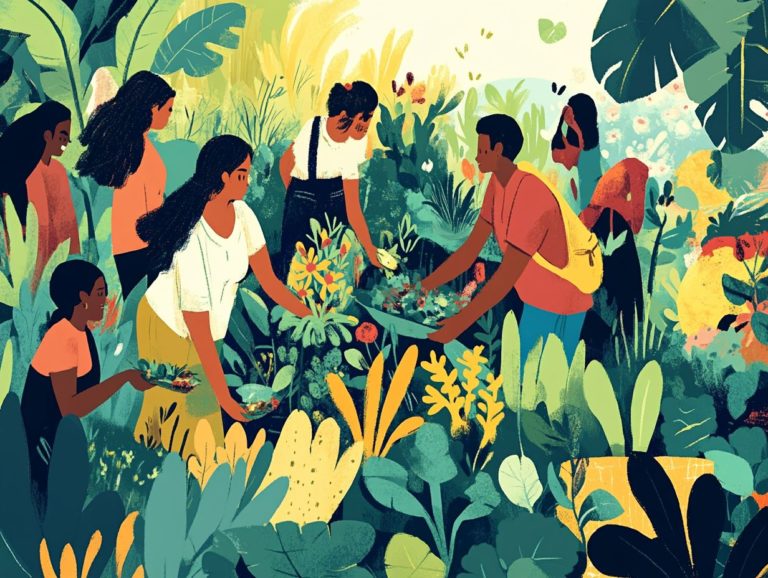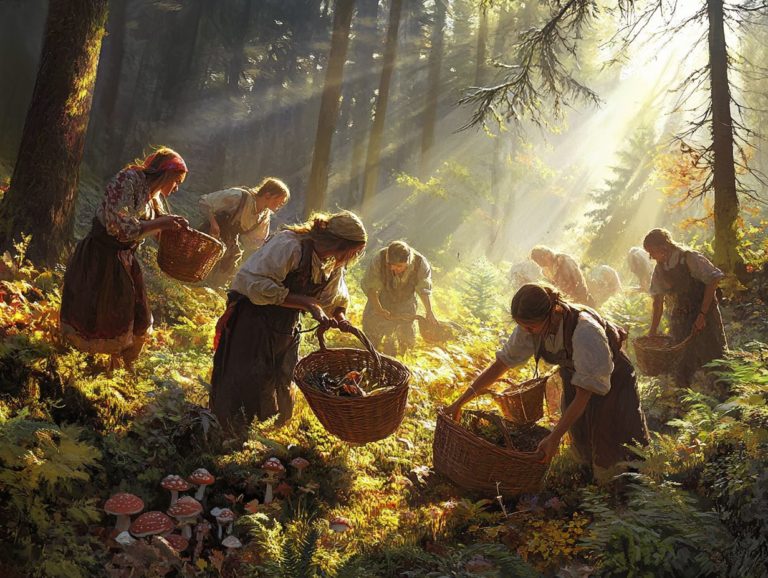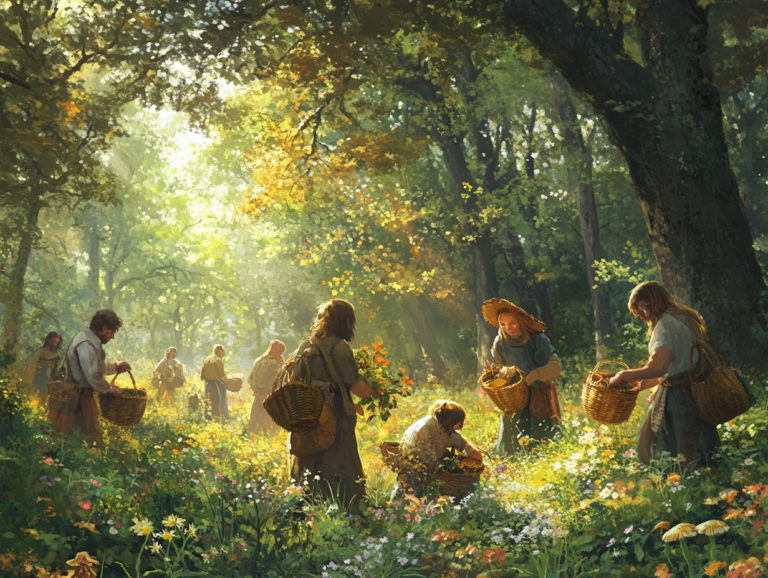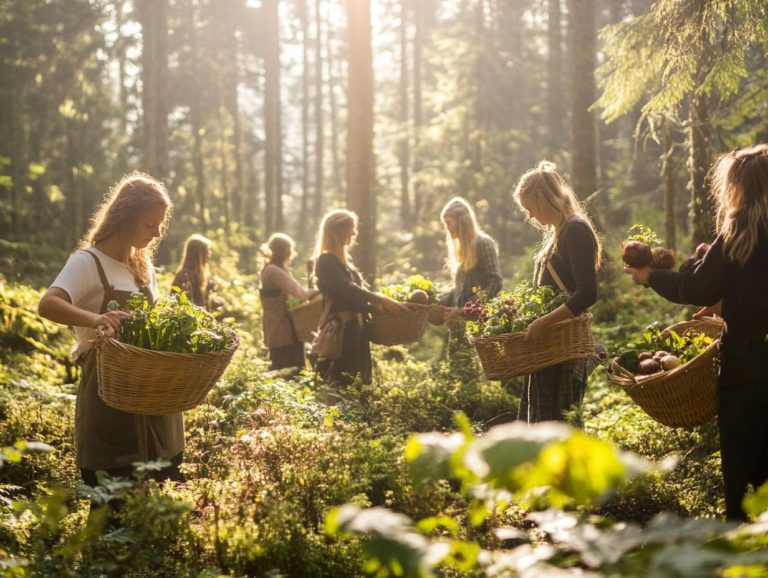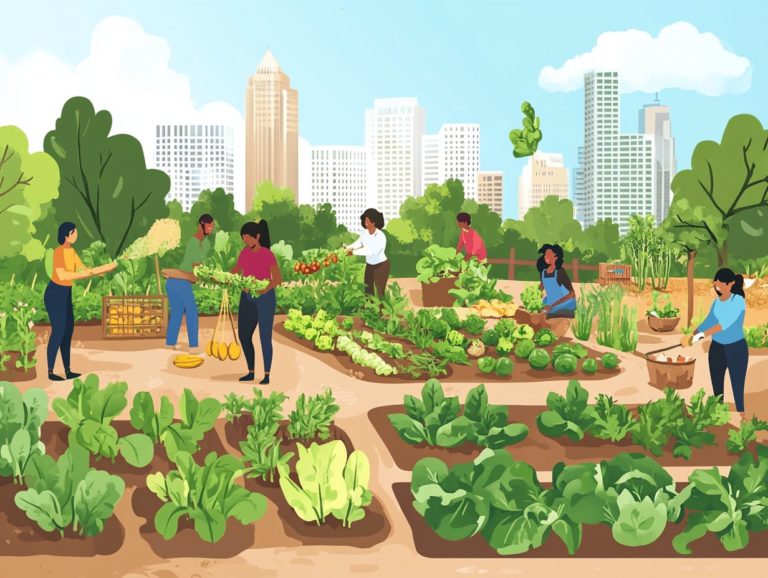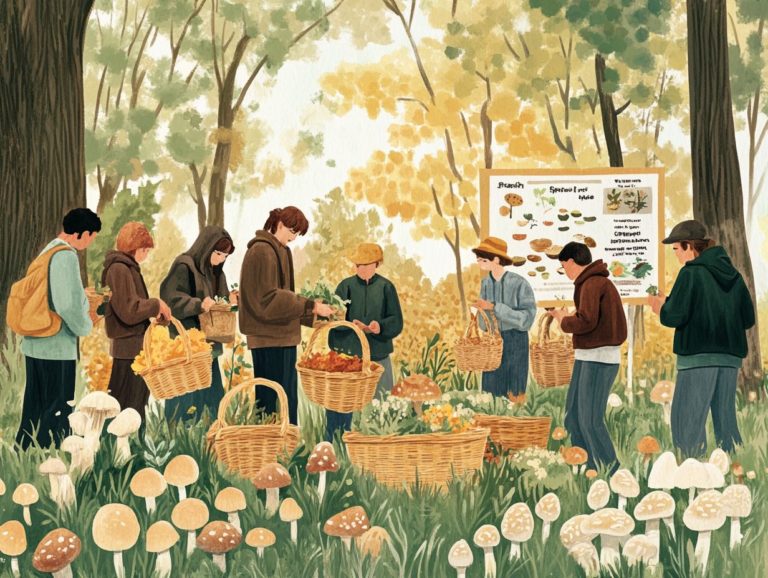How to Join a Foraging Workshop Near You
Foraging presents an exceptional opportunity to connect with nature and uncover the edible plants that surround you. This practice, often celebrated in urban locales like Chicago, is gaining interest as a vibrant movement within the Midwest.
Whether you re just dipping your toes into this adventurous realm or you’re already a seasoned foraging enthusiast, attending a workshop can significantly enhance your knowledge and skills while introducing you to others who share your passion.
This article will guide you through the essentials of foraging, what to anticipate at a workshop, how to locate one in your vicinity, and offer tips to maximize your experience, including ways to connect with local community groups on platforms like Facebook or Instagram.
Prepare to step outside and immerse yourself in the fascinating world of edible treasures!
Contents
Key Takeaways:
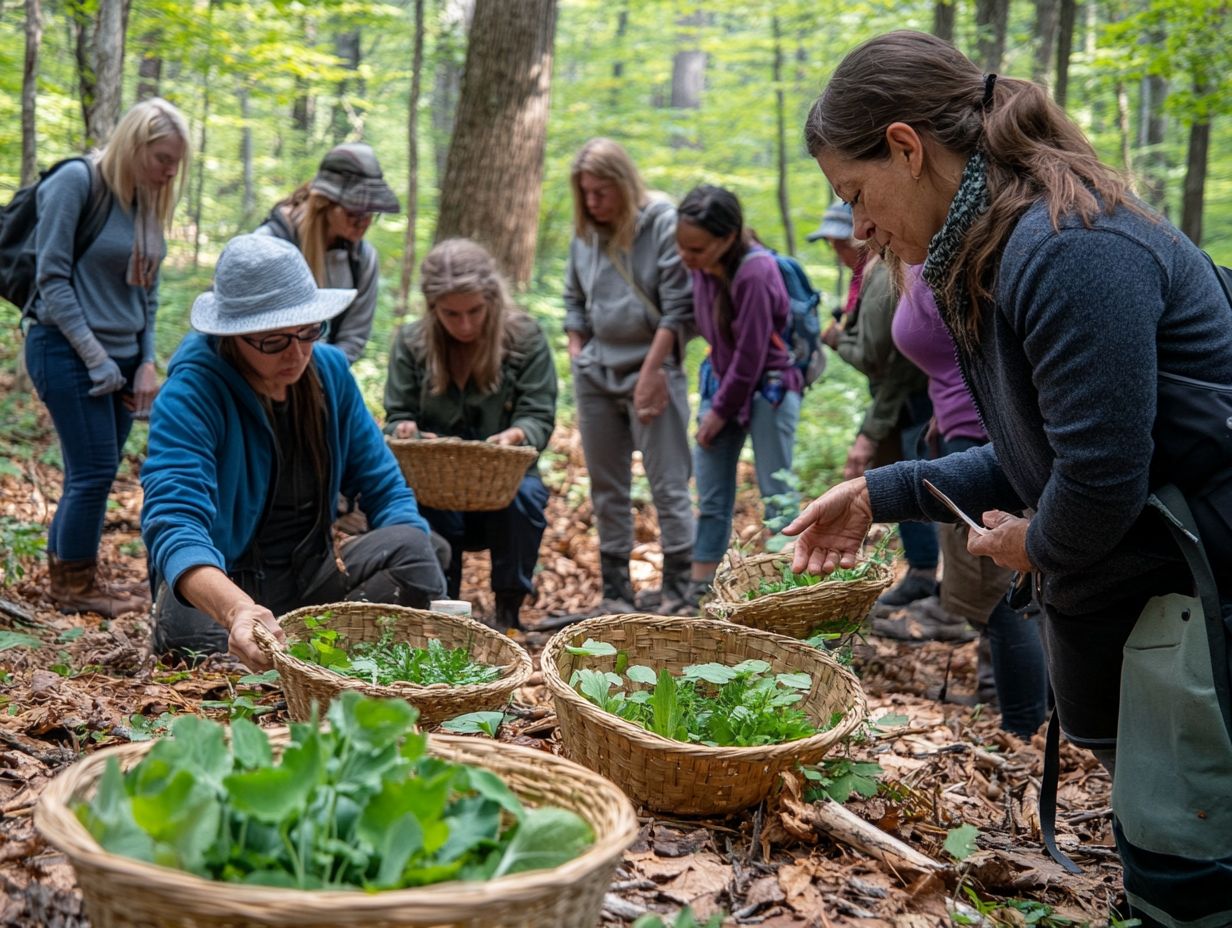
- Discover the benefits of foraging and learn about its basics at a foraging workshop near you.
- Get expert guidance and instruction at a foraging workshop, where you can expect to participate in fun and educational activities.
- Prepare for a successful foraging experience by researching local options, bringing proper attire and gear, and prioritizing safety at all times.
The Basics of Foraging
Foraging means looking for edible plants, mushrooms, and herbs in nature. This practice is becoming popular in urban areas like Chicago and across the Midwest.
As more people want to enjoy fresh ingredients, groups like Eat the Neighborhood and Odd Produce Inc. are leading educational efforts.
In this landscape, notable figures such as Dave Odd, alongside organizations like Eat the Neighborhood and events like the Midwest Wild Harvest Festival, are making substantial contributions to the foraging community. They organize engaging events and offer invaluable resources that enrich your foraging experience.
What is Foraging?
Foraging is all about finding and gathering food from the wild. You can discover plants like dandelions and wild garlic, or mushrooms like chanterelles and morels.
To forage effectively, you ll need to have a sharp eye and understand seasonal changes. It s crucial to grasp plant identification to steer clear of toxic impostors. Workshops offered by groups like the North Country Herbalist Guild or Minnesota Mycological Society can enhance your skills.
Keep in mind that legal regulations can vary widely, so it s essential to familiarize yourself with local laws concerning gathering in protected areas. This ensures that you honor the natural world while enjoying the abundance it offers.
Benefits of Foraging
Engaging in foraging gives you many benefits. It enhances your health through the consumption of fresh, nutrient-rich foods and fosters a connection with local ecosystems. You can also participate in community events that support sustainable practices, enriching your community experience by sharing knowledge and skills with others.
By seeking out seasonal produce, you diversify your diet and embrace a balanced way of eating. As you learn to identify edible plants in your area, you play a vital role in promoting local food systems, championing sustainable practices that benefit both the environment and your community.
This shared journey creates camaraderie among foragers, connecting like-minded individuals who celebrate regional biodiversity and prioritize healthful eating. The act of foraging can also serve as a therapeutic escape, reducing stress and enhancing your mental well-being as you immerse yourself in the beauty of nature, much like the experiences shared on social media.
What to Expect at a Foraging Workshop
Foraging workshops offer a carefully designed experience aimed at immersing you in the art of wild food gathering, often promoted through platforms like Facebook and Instagram. With expert guidance at your fingertips, you’ll engage in hands-on learning while accessing invaluable resources that deepen your understanding of this rewarding activity. You can also explore tips for starting your own foraging group and engage with initiatives like The Land of Odd.
Typical Workshop Activities
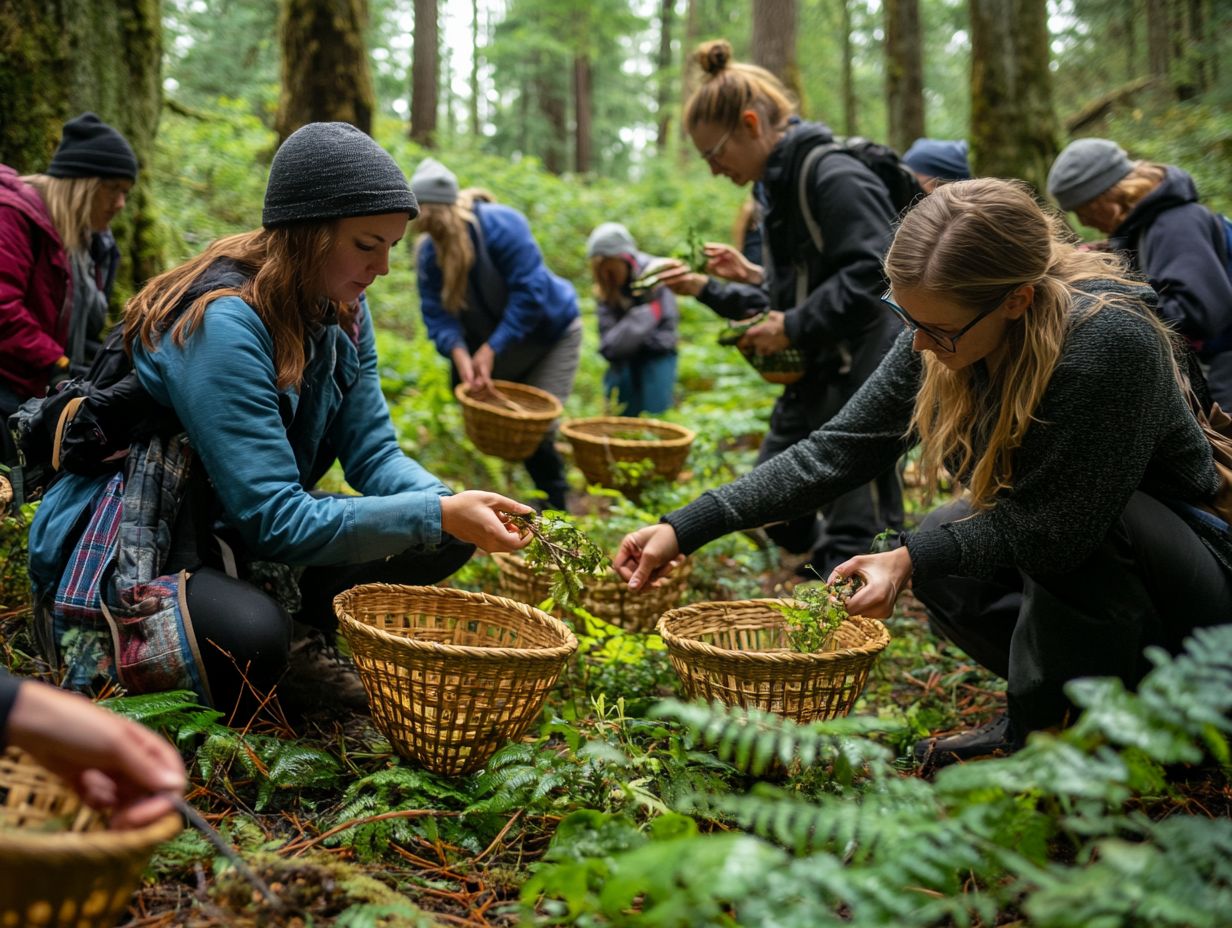
In a foraging workshop, you can expect a range of engaging activities, from guided nature walks to identify edible plants, to hands-on cooking demonstrations that showcase the art of utilizing your foraged finds. To learn more about opportunities, check out what local foraging classes are available.
You ll delve into discussions about sustainable foraging practices that not only enhance your skills but also deepen your appreciation for the natural world.
You might craft delightful foraged herbal teas or jellies, savoring the literal fruits of your labor. Opportunities for small group discussions about the ecological impact of foraging will arise, fostering a meaningful connection with your environment.
The workshops highlight the importance of ethical harvesting methods, ensuring you leave equipped with the knowledge to forage responsibly. You ll likely collaborate with fellow community members on recipe sharing, discovering diverse ways to incorporate your foraged treasures into your culinary repertoire, influenced by tips shared in workshops hosted by Ironwood Foraging Co.
Expert Guidance and Instruction
Expert guidance in foraging workshops is essential for you to master safe and effective techniques for identifying and gathering wild foods from their natural environments.
When knowledgeable instructors are present, your educational experience is significantly enriched, and you gain the confidence needed to venture into the wild. Their expertise helps you navigate potential hazards, distinguish between edible and toxic species, and understand how seasonal changes affect plant availability.
Through engaging demonstrations and hands-on learning, these seasoned guides share invaluable tips and tricks, turning your experience into both an informative and enjoyable adventure. Without proper instruction, the risks of foraging can easily overshadow the excitement, but with expert oversight, you re given the power to explore nature responsibly, deepening your appreciation for the world around you.
Finding a Foraging Workshop Near You
Finding a foraging workshop nearby can be an exciting journey! With a wealth of local offerings available through community events, social media platforms, and dedicated websites, you’ll discover how to organize a local foraging event and immerse yourself in this enriching experience.
Researching Local Options
To uncover local foraging workshops, you might start by perusing community bulletin boards, diving into social media groups, and exploring top local foraging events to participate in on websites dedicated to outdoor education and sustainable practices.
Consider checking out platforms like Meetup or Eventbrite; these sites are treasure troves where local groups frequently organize events, creating a vibrant space for enthusiasts to connect and share their passion.
Engaging with local environmental organizations or nature centers can also provide invaluable insights into workshops tailored to your specific region.
Connecting with local farms or agricultural cooperatives could open doors to exciting hands-on learning experiences.
These resources not only guide you to available workshops but also cultivate a sense of community among fellow nature lovers eager to embrace sustainable practices and refine their foraging skills, connecting through Threads for sharing experiences.
Join a workshop today and start your foraging journey!
Online Resources for Finding Workshops
You ll find a wealth of online resources to help you discover foraging workshops. These include educational platforms, engaging blog posts, and social media channels that connect like-minded enthusiasts.
A fantastic starting point is specialized websites dedicated to foraging education. They typically offer extensive lists of upcoming events and workshops. Additionally, you can explore volunteer opportunities for foraging enthusiasts and dive into social media groups on platforms like Facebook, where you’ll encounter community-driven discussions and event announcements. This makes it effortless to connect with local foragers.
Blogs centered on wild food and foraging tips are also a goldmine. They often share workshop recommendations and personal anecdotes that provide valuable insights. Don t overlook Instagram; it s a vibrant hub for foraging communities, featuring inspiring photos and stories. These encourage you to explore nature’s bounty while keeping you updated on relevant workshops and gatherings.
Preparing for a Foraging Workshop
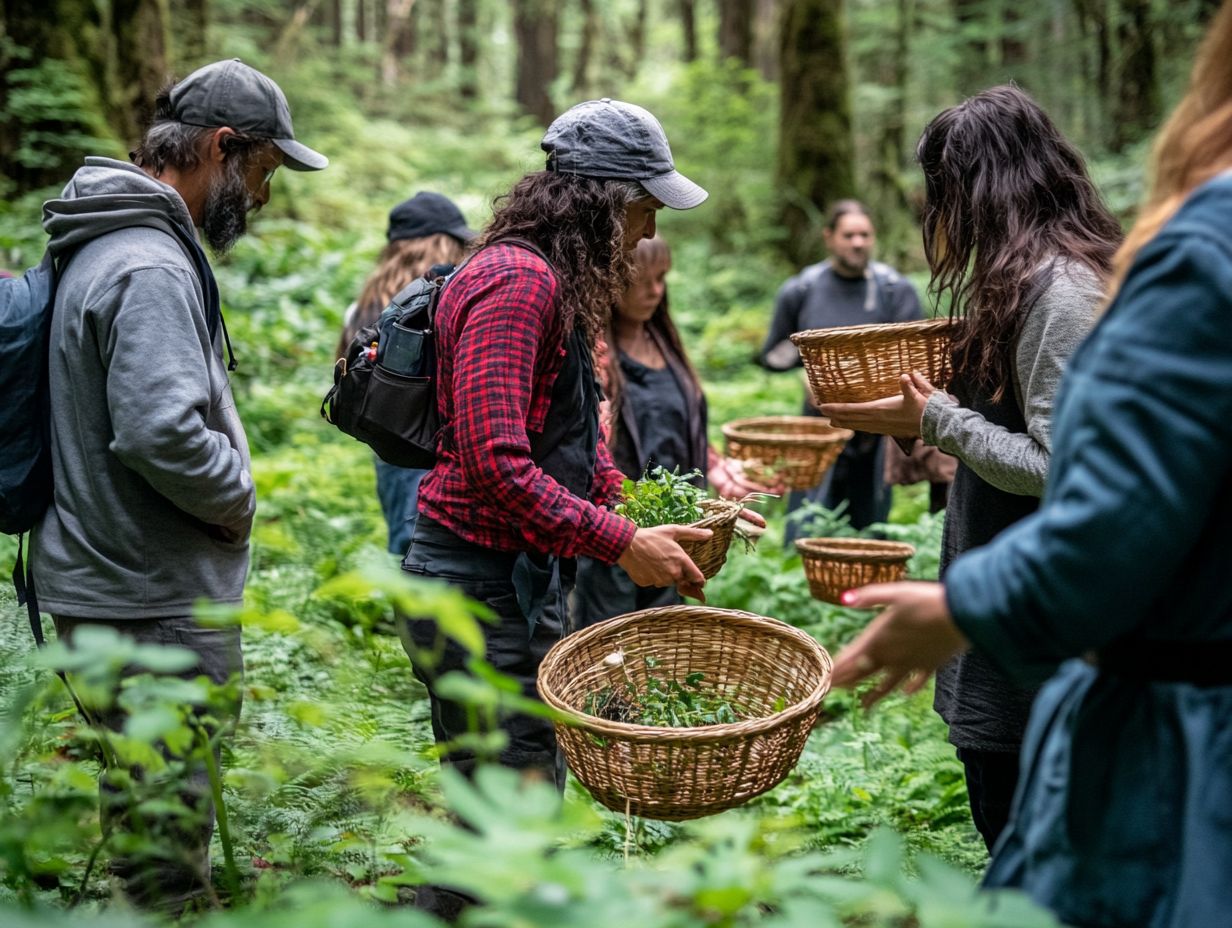
When preparing for a foraging workshop, gather essential items and select the right clothing. Familiarize yourself with crucial safety considerations to ensure a safe and enjoyable outing.
This careful preparation guarantees a fun and unforgettable adventure!
What to Bring and Wear
When you attend a foraging workshop, it s essential to pack the right items. A sturdy gathering basket, a reliable knife, and comfortable clothing paired with durable footwear are crucial for navigating various terrains.
Bringing along a field guide, a book that helps identify plants, specific to local flora will be important. It helps you accurately identify edible species while avoiding their toxic look-alikes. A small trowel or hand spade can also enhance your foraging experience, especially for digging up root vegetables or mushrooms.
In unpredictable weather, waterproof clothing is your best friend, keeping you dry and comfortable throughout the day. Don t forget a first aid kit; even a minor scrape can put a damper on your adventure.
With these foraging essentials in tow, you ll enhance your experience and ensure your safety while exploring the wonders of the great outdoors.
Important Safety Considerations
Prioritizing safety in foraging is essential. Be aware of your surroundings, learn accurate plant identification, and understand local regulations regarding foraging.
Familiarizing yourself with the characteristics of edible versus toxic plants is important, as some can closely resemble safe options. Utilizing a reliable field guide significantly boosts your confidence in identifying species correctly.
As you forage, consider the environment you’re in avoid areas treated with pesticides or pollutants to ensure the safety of your harvest.
Engaging with a knowledgeable group enhances your experience, providing valuable insights and facilitating shared safety practices. A thorough understanding of these foundational aspects is key to ensuring a safe and enjoyable foraging adventure.
Making the Most of Your Foraging Experience
Maximizing your foraging experience demands active engagement in the learning process. By taking notes and participating in discussions, you enhance your ability to retain information while forging meaningful connections with fellow foragers.
Tips for Learning and Retaining Information
Implementing effective learning strategies such as visual aids, hands-on practice, and group discussions can significantly enhance your retention of foraging knowledge.
By working together with others, you’ll engage more deeply with the material while benefiting from shared experiences and diverse perspectives. Community-based learning creates a supportive environment where you can comfortably ask questions and seek clarification.
Using tools like peer teaching and interactive workshops fosters a dynamic atmosphere that encourages deeper understanding.
Incorporating feedback mechanisms further reinforces concepts, helping you solidify your learning. Ultimately, these strategies work in concert to create a richer, more engaging workshop experience, showcasing the transformative power of teamwork in unlocking your potential.
Frequently Asked Questions
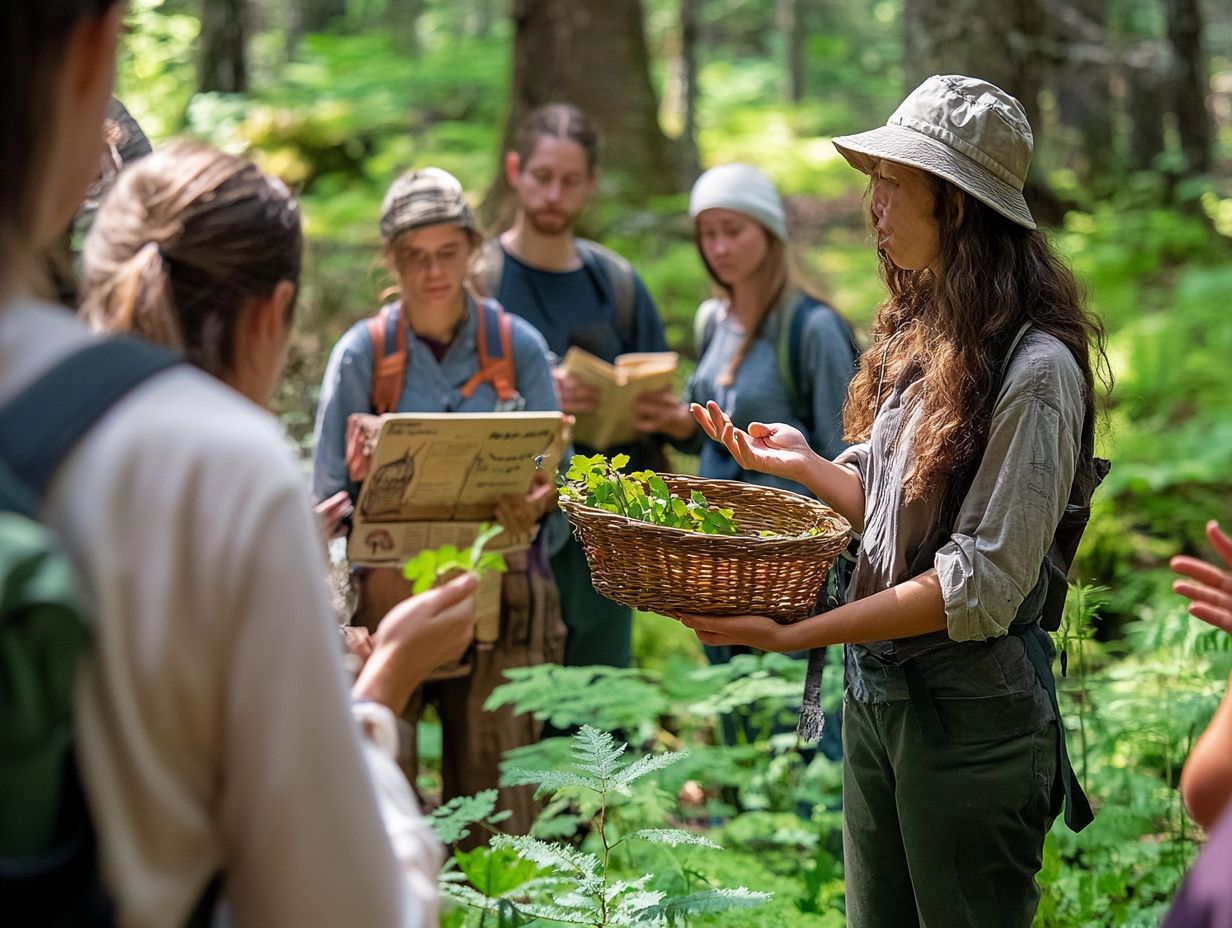
Curious about foraging workshops? Here are some common questions answered!
1. What is a foraging workshop?
A foraging workshop is an educational event where participants learn how to gather and identify wild edible plants, mushrooms, and other natural resources from their local environment. If you’re interested in this practice, you might explore how to start foraging as a hobby. Foraging is the act of searching for and gathering wild food resources.
2. How can I find a foraging workshop near me?
Get ready to explore nature! Search for a foraging workshop near you today! You can use the keywords “foraging workshop” and “near me” to search for events in your area. Additionally, learn how to use Meetup for local foraging events at local community centers, nature centers, and gardening clubs for upcoming workshops.
3. What do I need to bring to a foraging workshop?
It is recommended to bring a notebook and pen for taking notes, comfortable walking shoes, and a basket or bag for collecting foraged items. Don t forget to pack water and some tasty snacks for your adventure!
4. Do I need any experience to join a foraging workshop?
No prior experience is necessary to join a foraging workshop. These events are designed for beginners and experts alike, and the instructors will provide all necessary instructions and guidance. To learn more about attending such workshops, check out how to stay updated on foraging events.
5. What kind of plants and resources can I expect to forage at a workshop?
The specific plants and resources available for foraging will vary depending on the location and season. However, common items may include wild berries, mushrooms, herbs, and nuts.
6. Can I bring my children to a foraging workshop?
Bring your kids along for a fun learning experience! Some foraging workshops may offer activities for children, but it is best to check with the workshop organizers beforehand. Remember to keep a close eye on them at all times during the workshop.

